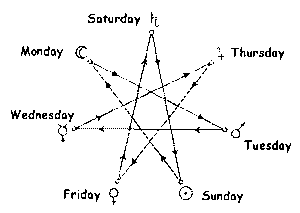Chaldean series: Difference between revisions
No edit summary |
No edit summary |
||
| Line 60: | Line 60: | ||
6. Jupiter's day <nowiki>=</nowiki> jeudi <nowiki>=</nowiki> Donar's day (donar is the German Jupiter) | 6. Jupiter's day <nowiki>=</nowiki> jeudi <nowiki>=</nowiki> Donar's day (donar is the German Jupiter) | ||
7th Venus day - vendredi = Freja day (freja is the German Venus) | 7th Venus day - vendredi = Freja day (freja is the German Venus) | ||
8. | 8. Vulcan day is not formed, because repetition, like octave Repetition is the prim.|89|73ff}} | ||
== Literature == | == Literature == | ||
Revision as of 09:01, 11 October 2021

The Chaldean series, which was handed down in Ptolemy's Tetrabiblos, but which originated with the Chaldeans or Babylonians[1] and still determines the order of our weekdays today, is based on the following arrangement of the planets:
| Saturn (Saturday) - Sun (Sunday) - Moon (Monday) - Mars (Tuesday) - Mercury (Wednesday) - Jupiter (Thursday) - Venus (Friday). |
This order also corresponds to the seven stages of world evolution that our planetary system passes through in the course of its development. The names of the planets, however, do not refer directly to our present planetary system, but to the so-called occult planets of the same name, which are earlier or future embodiments of our Earth. Our present state on Earth is represented by Mars and Mercury together, since according to Rudolf Steiner's findings the Earth's development is divided into a Mars half and a subsequent Mercury half:
| Old Saturn - Old Sun - Old Moon - Mars - Mercury - New Jupiter - New Venus Vulcan |
The last evolutionary stage of our planetary system, the future Vulcan, which still lies in the distant future, is not explicitly enumerated in this sequence, but results implicitly as a higher metamorphosis of the Old Saturnian state.
The Chaldean series can be derived by assigning the classical seven planets, beginning with Saturn, to the points of a seven-pointed star in a clockwise direction according to decreasing sidereal orbital period, and then following the lines forming the seven-pointed star, starting from Saturn, as shown in the adjacent drawing at the top right.
The sidereal orbital periods of the planets are:
- Saturn (10759.2 days = approx. 30 years)
- Jupiter (4332.6 days = approx. 12 years)
- Mars (687 days)
- Sun (365.25 days = 1 year)
- Venus (224.7 days)
- Mercury (88 days)
- Moon (27.3 days)
Read in ascending order from the Moon to Saturn, this arrangement corresponds exactly to the so-called occult order of the planets, in which Mercury and Venus are interchanged with each other compared to the usual heliocentric order.
„So you have as the different stages of our planet: Saturn, Sun, Moon, Mars, because from this came the strong influence, then Mercury, Jupiter, Venus and Vulcan. This is then expressed in the succession of the days of the week. The initiates have expressed the succession of earth incarnations in the names of the days of the week. You must begin with Saturday, which was Saturn's day. It is still called Saturday in English, and Zaterdag in Dutch. Then comes Sunday, Monday, Mars Day, French mardi; in ancient Germanic Ziu was the god of war, hence "Zius Day", English Tuesday. Wednesday is a more exoteric name, it was called Mercury's Day by the ancients, mercredi in French, Wodan's Day in Germanic - because Wodan is a Mercury being - Woensdag in Dutch, Wednesday in English. Then we have Jupiter's Day, jeudi in French. The Germans' Jupiter is Donar, the thunderer, so Thursday. Then Venus Day, French vendredi, German Freyatag. And then it begins all over again, because Vulcan is a new stage of Saturn.“ (Lit.:GA 96, p. 244)
Rudolf Steiner reported on this in great detail in an enclosure to a letter to Marie von Sivers dated 25 November 1905:
Literature
- Philipp Melanchthon: Phil. Mel. interpretatio operis Quadripartiti Claudii Ptolemaei de praedictionibus astronomicis in Corpus Reformatorum, Vol. XVIII, Philippi Melanchthonis Opera quae supersunt omnia, Halle 1852.
- Johann Jakob Herzog: Real-Enzyklopädie für protestantische Theologie und Kirche, 17. Band, 1863, S. 256 google
- Frank Egleston Robbins (Hrsg. und Übers.): Claudius Ptolemy, Tetrabiblos. Harvard University Press, Cambridge (Massachusetts)/London 1940.
- Claudius Ptolemy, Erich M. Winkel (Übers.): Tetrabiblos: Nach der von Philipp Melanchthon besorgten seltenen Ausgabe aus dem Jahre 1553, 3. Auflage, Chiron Verlag 2012, ISBN 978-3925100178
- Elisabeth Vreede: Astronomie und Anthroposophie, 2. Auflage, Verlag am Goetheanum, Dornach 1980, ISBN 978-3723502501
- Joachim Schultz: Rhythmen der Sterne, 3. Auflage, Verlag am Goetheanum, Dornach 1985, ISBN 978-3723501795
- Hartmut Warm: Die Signatur der Sphären: Von der Ordnung im Sonnensystem, Verlag Keplerstern, 3. Auflage, 2011, ISBN 978-3935958059
- Walter Kraul: Erscheinungen am Sternenhimmel: Himmelsbeobachtungen leicht gemacht, Verlag Freies Geistesleben 2014, ISBN 978-3772519758
- Rudolf Steiner: Bewußtsein – Leben – Form , GA 89 (2001), ISBN 3-7274-0890-1 English: rsarchive.org German: pdf pdf(2) html mobi epub archive.org
- Rudolf Steiner: Ursprungsimpulse der Geisteswissenschaft, GA 96 (1989), ISBN 3-7274-0961-4 English: rsarchive.org German: pdf pdf(2) html mobi epub archive.org
- Rudolf Steiner: Das Verhältnis der verschiedenen naturwissenschaftlichen Gebiete zur Astronomie, GA 323 (1997), ISBN 3-7274-3230-6 English: rsarchive.org German: pdf pdf(2) html mobi epub archive.org
 |
References to the work of Rudolf Steiner follow Rudolf Steiner's Collected Works (CW or GA), Rudolf Steiner Verlag, Dornach/Switzerland, unless otherwise stated.
Email: verlag@steinerverlag.com URL: www.steinerverlag.com. Index to the Complete Works of Rudolf Steiner - Aelzina Books A complete list by Volume Number and a full list of known English translations you may also find at Rudolf Steiner's Collected Works Rudolf Steiner Archive - The largest online collection of Rudolf Steiner's books, lectures and articles in English. Rudolf Steiner Audio - Recorded and Read by Dale Brunsvold steinerbooks.org - Anthroposophic Press Inc. (USA) Rudolf Steiner Handbook - Christian Karl's proven standard work for orientation in Rudolf Steiner's Collected Works for free download as PDF. |
